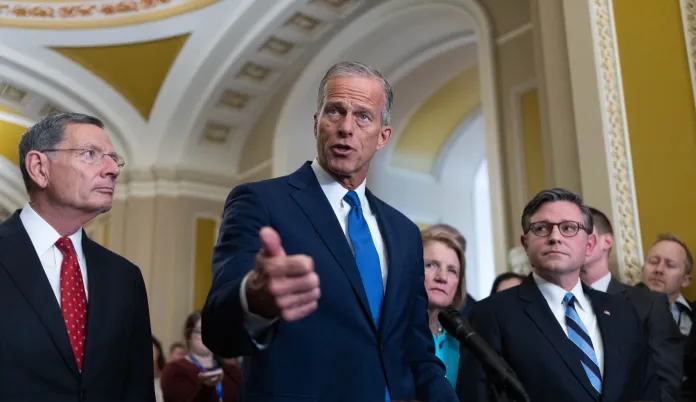EXCLUSIVE — Senate Majority Leader John Thune (R-SD) is trying to wrest a narrative over healthcare away from the Democrats, telling the Washington Examiner that Republicans have been discussing ways to improve affordability as it becomes a flashpoint for 2026.
“You got to have an alternative,” Thune said during a Wednesday interview at the Capitol. “You need to have something to be for. And I think what we’re for is affordability, accessibility, and lowering costs, rather than having costs go up.”
Thune confirmed that GOP leadership, along with the relevant committee chairs, have been discussing how to reform premium Obamacare subsidies once the government reopens from a weekslong shutdown, a conversation spurred by Democrats who want to make them permanent before they lapse at the end of the year.
But he said the conversation is bigger than the subsidies themselves, signaling there could be a grand bargain on the horizon that trades the concession for Republican priorities in the healthcare space.
Thune declined to divulge policy details, but GOP lawmakers see healthcare as a weakness next year, when the party will be defending a wafer-thin House majority and a few vulnerable Senate seats, and have begun floating Republican counterproposals.
Thune and his House counterpart, Speaker Mike Johnson (R-LA), have kept the door open to a subsidy extension but with more stringent eligibility requirements, including income limits. House Majority Leader Steve Scalise (R-LA), meanwhile, has suggested other measures like tax-free health savings accounts that could be packaged with a subsidy deal.
For now, the subsidies have become a political cudgel used by Democrats to blame Republicans for the rising cost of healthcare premiums and represent the single biggest obstacle to reopening the government. But Thune’s comments reflect an emerging GOP rebuttal to that critique.
In the interview, he suggested the enhanced subsidies were masking what for years has been an unsustainable increase in premiums, flipping on its head the Democratic argument that Republicans, by resisting a subsidy deal, were forcing insurance companies to raise costs on consumers.
“It’s a program that is designed to be inflationary, and we think that healthcare and healthcare insurance ought to be anti-inflationary, deflationary,” Thune said. “You ought to be looking for ways to make it more affordable, drive costs down, and everything about Obamacare drives it up.”
In some ways, the message is a continuation of how Republicans have presented the Affordable Care Act since it was first enacted in 2010, and, later, as the party failed to repeal it when they took control of Washington in President Donald Trump’s first term.
But the enhanced subsidies, implemented by Democrats under former President Joe Biden, have added a new wrinkle, with Thune noting that Democrats made them more accessible during the pandemic but failed to lock them in permanently when they had power.
“It’s a cliff they created. It’s a program they created,” Thune said, referencing the Biden-era American Rescue Plan and Inflation Reduction Act that created and subsequently extended the enhanced benefits through 2025.
“There wasn’t a single Republican, living or dead, who voted for the original Obamacare. There isn’t a single Republican, living or dead, who voted for these enhanced subsidies,” he continued. “They’re expecting us to solve a problem they created.”

Publicly, Republicans have floated myriad proposals that could strike a middle ground, but the party has yet to coalesce around a single solution, a challenge given that Johnson only controls the House by two votes. More centrist members, including Rep. Mike Lawler (R-NY), are open to extending the subsidies for another year untouched, while the conservative Freedom Caucus is expecting significant concessions and new limits on them.
Rep. Marjorie Taylor Greene (R-GA), a frequent critic of leadership, has added to that divide by calling the lack of a GOP position “unacceptable.”
In response to the criticism, Johnson has told reporters that Republicans are, in fact, engaged on the issue.
“We have been working on this for a long time. We worked on it today. We’ve been working on it every day,” he said on CNN Wednesday.
Thune, for his part, does not face the same kind of public criticism from within his Senate conference, but he is navigating a daily drumbeat from Democrats who believe the focus on healthcare in the shutdown fight will help them deprive Trump of a unified GOP Congress for the final two years of his second term.
THUNE TEASES SHUTDOWN VOTES TO PAY TROOPS AND AIR TRAFFIC CONTROLLERS
As a policy matter, Democrats say the expiring subsidies are part of a double whammy faced by consumers in the wake of Trump’s tariffs. In a Thursday memo, House Democrats’ campaign arm cited internal polling from battleground districts, showing that 52% of respondents said healthcare and prescription drugs should be top priorities of Congress to combat the cost of living.
Amid the shutdown gridlock, Democrats want a commitment that the Obamacare credits will be addressed, but Thune has said Republicans cannot make that guarantee given the delicate GOP politics.
